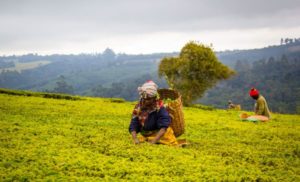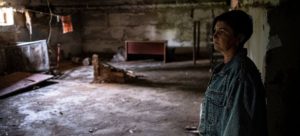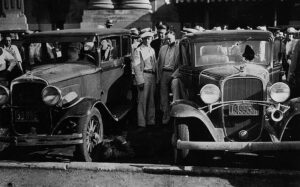Actor Devery Jacobs, director Sydney Freeland, and writer Tommy Pico reflect on the world-affirming successes and representational shortcomings of their new show.
I never thought I’d hear the words “skoden” on a Hulu/FX show. Used either as a meme or in earnest between Native Americans, it’s Rez slang for “let’s go then.” Within the first minute of Reservation Dogs’ pilot, a decisive “skoden” throws its four main characters into a hot chip truck heist. As a Seminole Indian who grew up on the Rez, that level of recognition was exhilarating.
Reservation Dogs, a critically acclaimed coming-of-age comedy following four Indigenous teenagers struggling to leave rural Oklahoma, is a big deal to Natives everywhere. Co-created by Maori trailblazer Taika Waititi (Thor: Ragnarok, Jojo Rabbit) and Seminole/Muscogee Creek filmmaker Sterlin Harjo, best known for Sundance premieres like 2009’s Barking Water and the 2014 documentary This May Be the Last Time, the eight-episode season debuted August 9 and has already been picked up for a second season.With such influential Native storytellers in charge, Reservation Dogs portrays its characters and Rez community with nuance and great care.
Queer Kahnawà:ke Mohawk actor, filmmaker, and activist Devery Jacobs plays Elora Danan, the tough but kind-hearted brains behind the operation to leave Oklahoma far behind. She stars alongside the hilarious D’Pharaoh Woon-A-Tai(Oji-Cree) as Bear Smallhill, Paulina Alexis (Alexis Nakota Sioux) as Willie Jack, and Lane Factor (Creek Seminole and Caddo) as Cheese. The crew — unofficially dubbed “the Rez Dogs” by kooky locals, a nod to Quentin Tarantino’s 1992 cult crime film Reservoir Dogs — sell car parts to a junkyard, eat catfish, visit the “NDN clinic,” and do what they can to scrounge together enough money for their California dreams.
Queer and trans Native representation on Reservation Dogs only deepens when you look behind the camera. Acclaimed trans Navajo filmmaker Sydney Freelandworked as one of the five Native directors. Her 2014 debut feature film Drunktown’s Finest premiered at Sundance, while her latest directing credits include Netflix’s Deidra and Laney Rob a Train (2017) and Rutherford Falls, a Peacock original show by Navajo showrunner Sierra Teller Ornelas with appearances from Jacobs and Alexis, too.
To top the Reservation Dogs dream team off, Waititi and Harjo assembled a room of sharp, funny-ass Native writers like the 1491’s Bobby Wilson (Sisseton-Wahpeton Dakota) to bring the Oklahoma Rez to life. For Tommy Pico, the screenwriting gig marks a well-deserved first. Pico — who grew up on the Viejas Indian reservation of the Kumeyaay Nation — began his writing career as an award-winning poet before branching out to film and TV. He’s also a podcast host (Food 4 Thot, Scream, Queen!), a self-proclaimed obsessive of “boys, burgers, booze,” and is even venturing out into acting alongside his Indigenous contemporaries.https://284bb09f01cdc764fd8bf3d47b4e0f7f.safeframe.googlesyndication.com/safeframe/1-0-38/html/container.html
Ahead of the show’s hotly anticipated season finale, Jacobs, Freeland, and Pico sat down to talk with them. Despite Zoom’s limitations, the three bounced off each other’s energies and intuitively stepped back to let the other speak. The trio discussed the intersectionality of Indigenous and queer humor, the bittersweet power of homecoming, the significance of Two-Spirit identity, and more.
As a queer Indigenous woman myself, I could feel the collective excitement of such a big feat for Native art like Reservation Dogs buzzing through our screens.
Reservation Dogs is first and foremost a comedy. I was cracking up, especially at the culturally-specific humor that didn’t pander to a non-Native audience, like the censoring of the owl’s face or the absurdness of Dallas Goldtooth’s spirit character describing his “real rugged-like” death in battle. In both Indian Country and the LGBTQ+ community, humor and laughter are how we overcome or process trauma without victimizing ourselves. What did working in this genre show you about your own identities?
Tommy Pico: I think humor is a tool — a marker of resilience, a willingness to heal and to be productive in that. It can be a way to take the air out of a situation, to make certain things more digestible. It’s also medicine.
Devery Jacobs: I’ve worked in some comedies here and there, but never in a comedy that spoke so deeply to my experience growing up on my reserve up in Canada. My mom always said, “Well, if you don’t laugh, you’re going to cry. So, you might as well laugh it off.” There’s such an element of Indigenous and queer humor that is funny and teasing, but it’s also a little bit biting because there’s a painful truth in there.
TP: I like what you said, Dev. A lot of the humor-overlap between LGBTQIA+ stuff and Native stuff is a real sense of tragedy, of adversity. One of my first memories ever at a funeral [was] being in one room where people were telling stories and weeping, then going to another where people were telling stories and laughing. It was all the same continuum: The levity and the depth earn each other.
“It was a prelude to laughter. Being made fun of outside of the Rez was a prelude to violence,” says Pico.
Tommy, on Sterlin’s podcast “The Cuts,” you said that growing up on your Rez, you were the Elora scheming to get out of the place you associated with trauma. And you did it. What is your relationship with home as a queer Indigenous creative who has gone out and made these queer connections and figured out their artistic endeavors?
TP: Leaving the Rez was as much about leaving the area outside of it, like the direct outside borderlands — the places where I actually felt in danger. I never felt homophobia on the Rez. I felt homophobia outside. [On the Rez,] we all took potshots at each other. Yes, they made fun of me for being effeminate. But then I made fun of my cousin who couldn’t read, you know what I mean? [Laughs] It was a prelude to laughter. Being made fun of outside of the Rez was a prelude to violence. That’s one of the reasons why I wanted to leave so bad.
2019 was the first time I actually went back [to the Viejas Indian reservation] and read poetry at the tribal hall. I got to meet with middle schoolers and high schoolers, and they were so excited for me to come home and share what I had done. I wish that I had given my community more, because I did a lot of rejecting in my teens and early twenties. I was the Elora. I did all the scheming, and I got out. But I do feel like I missed some years there of being home and being with the people. I didn’t give them the chance to love me. I took that out of the equation too early. And now that I’m coming back and I’m reconnecting with people, it’s been such a blessing. Part of that has to do with working on Reservation Dogs.
Sydney Freeland: When Tommy talks about having a different relationship to the reservation, that makes a lot of sense for myself as well. Traditionally, my tribe was very open and accepting of transgender individuals. But then on the other hand, for me growing up, you would call people nádleeh, which essentially was used as “f****t.”.
I had to leave the reservation because I couldn’t transition there. I moved to San Francisco with $45 in my pocket and I transitioned; it was a much safer environment. I would do these group therapy sessions, and after one, this woman and I were talking on the sidewalk. She found out I was Native and said, “Oh wow, you’re Native. It must be a paradise for trans folks because it’s so open and accepting.” And I was like, What are you talking about? No, it’s not. But that conversation actually led me to go back home and start talking to relatives, asking more about my own culture that I had grown up in.
I came to learn that nádleeh actually means “the changing one,” some of the first people that our creator made. They were made before men and women, and they’re actually held in very high esteem in our society. So, like Tommy’s saying, it’s a complicated relationship in that I grew up in this environment, but I had to leave to come back and learn more about my environment, you know?
DJ: My journey with queerness has been a little different. It was only when I was into adulthood that I realized my queerness. Growing up on my Rez, I was the opposite of Elora. I never wanted to leave. Also, where I’m from is dissimilar to a lot of different reservations in the sense that it’s so close to a major city that has three million people. [The Mohawks of Kahnawà:ke] have a lot of economic prosperity, yet I still grew up on the dead end of a dirt road in the middle of the bush. I had the best of both worlds and I was fortunate enough to grow up in a community that is so full of pride for being Mohawk. My tóta, my grandmother, was the principal of the Mohawk [language] immersion school. I was very privileged on that front.
When I did realize I was queer, it forced me to look at my relationship with my community differently because I thought that being Mohawk and being queer were mutually exclusive. I think one of the big reasons for that is because the Kahnawà:ke reservation where I’m from was originally formed as a reservation for Catholic Mohawks. That’s where Saint Kateri, the first Native American Saint, is from.
So, I’m not even sure, traditionally, how Kahnawà:ke viewed queer folks and trans folks. I know Two-Spirit is a term that is used in a lot of communities, but as far as I know, Mohawk people didn’t. That’s been my reservation in using that term, despite me feeling that it’s beautiful and one that I could, if I were from another nation, potentially connect with. It’s been a lot of learning and undoing the colonization that my community faced and continues to carry with them to reconcile these parts of myself, to actually be whole in my queerness and in being Mohawk.
TP: I also don’t feel comfortable using the term Two-Spirit for myself. When I was in college, I researched my tribe because, of course, all that information was lost in my grandmother’s generation as she went to the [Indian] boarding schools. She didn’t really pass on the language down to my father, so he didn’t pass it down to me. I didn’t really get any of the traditions. But when I read about it and found out that there were extragendered and different sexual roles in Kumeyaay communities, I was like, I wish I could have heard this from my grandmother and not from this anthropological textbook. She couldn’t tell me. And the divide was so close — I’m not talking about hundreds of years ago. I’m talking about my grandmother’s generation, where there was a complete loss of all this knowledge.
“I came to learn that nádleeh actually means “the changing one,” some of the first people that our creator made,” says Freeland.
Black Natives and their allies have spoken up on social media about the “anti-Blackness” of Reservation Dogs in the way that it showed certain aspects of reservation culture without calling it into question. Specifically, as one Twitter user put it, the show portrays Black cultural signifiers like aesthetics and rap music as a “shorthand for criminality or poverty.” People have also criticized the lack of Black Native actors. This is something that, within Indian Country, is an ongoing, inter-community discussion that we’ve been reckoning with, especially in the midst of the Black Lives Matter movement. How do y’all believe production can move forward with these critiques in mind?
DJ: I think that’s going to have to be conversations had with Sterlin and producers on the show and the decision making behind it. I hear what people are saying. And I think there is anti-Black racism in Indigenous communities that absolutely needs to be addressed.
As an actor, I’ve been asked how it feels to represent Indigenous people with playing Elora, or how I approach that pressure in playing this role. For me, I have said that I can’t represent everybody. I can’t. All I can do is tell the truth of this character and this story and my experience as a Kahnawà:ke, queer actress bringing my perspective to those roles.
TP: There is a sense of expansion as you go from one season to the next. The worlds do get bigger and perspectives do change and widen. And that’s the work, I think, of any show and of any feature or character. Things compound and complicate and broaden.
One of the things Sterlin talked about doing with Reservation Dogs was starting in media res. Like, we literally start with these kids stealing a chip truck. And I think that means there was a little bit more of a narrow focus into these four characters’ lives that we’ll see widen.
“It’s been a lot of learning and undoing the colonization that my community faced and continues to carry with them to reconcile these parts of myself, to actually be whole in my queerness and in being Mohawk,” says Jacobs.
Sydney, you’ve detailed the long, difficult process of getting your debut feature film Drunktown’s Finest (2014) made. A lot of what you heard was investors saying, “Make it white.” What was it like to then be part of an all-Native show like Reservation Dogs?
SF: It’s a very surreal feeling, but in a good way. My first film was so difficult to get made because it was too diverse. I’ve been working in a vacuum for a long time. And I’m usually on sets where I’m the only one of me. And then Rutherford Fallsis this massive leap. You’ve got Sierra [Teller Ornelas] as a Native showrunner, Native writers, Native directors, and it completely changes everything. And then Reservation Dogs takes it even further. I’m on the monitor and I call cut. I turn around, and it’s all my friends: Migizi [Pensoneau], Sterlin, Tazbah [Chavez], Blackhorse [Lowe], and they’re cracking up along with me.
It’s happening so fast and so quickly that I’m still trying to process that. But the feeling I would describe is just joy. I feel joy to be making Native stories with Native folks.
Similarly, how far have you, Devery, seen the industry come in terms of including Indigenous voices?
DJ: I’m also so used to being the only queer or Indigenous person on set. And then to work on a show like this, where there are LGBTQ2S+ Native folks everywhere? I was just like, What? Where have I walked into? Now that it’s happening, I never want it to stop.




